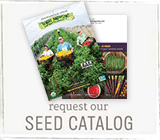Farm Ethics
-
Farmland Transitions Part 2
While challenges and pressures will continue to exist for those who hope to stand up to the problems inherent in our modern food system, there are always those who have gone before and those who are finding solutions to these issues today. Connecting to elders, collaborating with community members, reaching out to other farmers, and tapping into the local and... -
Farmland Transitions Part 1
While there has never been more access to information for young farmers seeking to learn, it seems as though acquiring the land and capital to start an agricultural enterprise has never been more difficult. As this newest generation of agrarians face the mounting pressures of student debt, finding land with good access to markets, systemic racism in land ownership, and... -
6 Reasons to Grow Your Flowers From Organic Seed
As the days lengthen, the air warms, and the soil thaws from a long winter, we’re all ready for spring. And with spring comes flowers. Lots of them. From Easter to Memorial to Mother’s Day, to any sunny bird-song filled day, there is no shortage of reasons to buy flowers. Instead of heading to the supermarket to pick up a... -
Why They Grow: The Story Behind Our Catalog Cover
While all of the growers featured on our 2018 catalog cover use High Mowing seeds in their operations, more than seed ties them together. What they’re growing extends well beyond great vegetables: they grow healthier families, future leaders and new models for organic distribution. These nontraditional crops exemplify a shared dedication to nourishing our community, a value High Mowing equally... -
Functional Farming
How Functional Training Can Improve Farming Performance and Health by Cristina Cosentino & Jesse Lapiana I’ve never seen a farming job description that didn’t feature “must be able to repeatedly lift 50 pounds” in its qualifications. Growing veggies is one of the most physically demanding, strenuous jobs. In fact, I don’t know a single farmer without back pain. While agricultural apprenticeships are... -
Year of Giving: Where Our Donations Went in 2017
“We want to know how we can help.” It’s the phrase Tom Stearns, High Mowing’s owner and founder, starts with when he’s talking to an organization he admires. And there are plenty to admire these days—farm to school initiatives, school garden initiatives, food desert elimination work, community garden programs, church gardens, food bank gardens, disaster relief groups... -
Disease-Free Seed
The diseases black rot (Xanthomonas campestris pv. Campestris) and black leg (Phoma lingam) represent a serious threat to brassica crops like broccoli, cauliflower and cabbage. They can wipe out whole fields and spread rapidly to surrounding farms, potentially devastating not only vegetable crops but also brassica seed crops in places like the Pacific Northwest, a heavy seed-producing region. High Mowing... -
Earth Day
On Earth Day, we like to take the time to reflect on how our work with organic seed fits into the framework of environmental and climate literacy. Although on the surface Earth Day may seem unrelated to agriculture – rather, you might wonder, isn’t it about a return to nature, protecting wildlife and natural habitats, recycling and cutting down on... -
Consumer Reports Classifies Non-GMO Project Verification Seal as “Highly Meaningful”
We here at High Mowing Organic Seeds are proud to announce that our partner and third-party verification organization, The Non-GMO Project, recently received Consumer Reports’ highest ranking for meaningfulness on its Non-GMO Project Verified seal. In April 2017, a report by Consumer Reports’ Greener Choices categorized the Non-GMO Project Verified seal as “a highly meaningful label for consumers wishing to avoid GMOs... -
Why Choose Organic Seed?
When the USDA's National Organic Program (NOP) began requiring organic farmers to use organic seed back in 2002, the organic seed industry was virtually nonexistent. There just weren't that many seed companies focusing on organics. The past fourteen years have witnessed a rapid expansion of the organic seed industry. The availability of organic seed has never been as strong, and...


